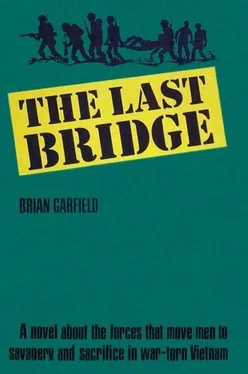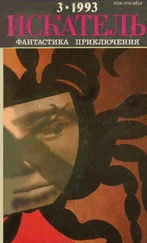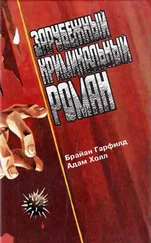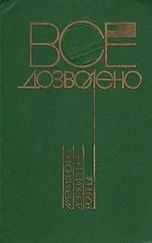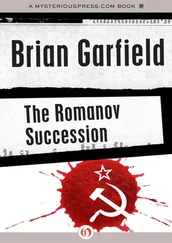There was nothing to see. Dark gray false dawn flooded his vision. He fell through space, turning slowly. Abruptly the shroud lines fluttered stiff; the chute opened with a snap that grabbed his shoulders and all but tore him in two. He felt flashes of bright pain from the harness buckles and knew he would suffer the bruises for days.
He had the feeling he was turning cartwheels; he threw his head back and gulped for air. He thought he could make out several billowing canopies above him. The dim red flames of the C-47’s exhausts wheeled away as it circled across the sky in a steep climb; he could hear the strained buzz of its engines.
His heavy load of equipment dragged him swiftly downward against the pull of the shroud lines. He felt sick in a moment of vertigo. There was a jagged reef down there; he had an instant of stark fear. His eyes found and locked on the vague flashes of surf crests. He dropped plumb.
The sea would be cold. He filled his lungs with air. He thought he heard someone cry out. His body jerked in a spasm of tremors, and then his boots cut the surface and the frigid black water swallowed him.
The bitter cold paralyzed him, constricting his chest; he felt immediately suffocated. The shroud lines wound around him like spaghetti. He pedaled with his legs in a moment of panic and tore a line from around his throat; instinct born of hard training moved his hands to the harness buckles, and his fingers fumbled with them. Water got in his nose and eyes and mouth. The buckles would not give way to his attacks, and he let them go; he clawed at the scuba mouthpiece, found it, and put it in his mouth. Flashes of color darted in his vision. He blew through the mouthpiece with his last reservoir of spent air and wheezed a rattling breath inward; he choked on the spray of water it forced down his lungs.
His body swept back and forth like a pendulum, snarled in the shroud lines, tugged about by currents in the cold surf. The canopy had collapsed on top of him and the weight of his equipment slowly pulled him down. He breathed in short, rapid bursts; the pure oxygen made him lightheaded. He made himself hang idle until his pulsebeat came under control, whereupon he made a second assault on the harness fasteners.
A fish, or a strand of seaweed, brushed his open eye, and he jerked his head back. When he broke loose from the parachute, the dead weight of his equipment carried him right down until his ears popped and his head was ready to cave in with pressure. His heavy boots tripped over a rough bottom and he went to his knees, moving like a dream figure in a slow-motion film. The water was murky; there was no light from above; he could not see a thing.
He turned until he felt the undercurrents press against his face, and moved that way, into the undertow, feeling ahead of him with a hand he could not see. It was hard to judge the slope of the bottom. Spires of coral got in his way; sea moss made footing slippery, and once he recoiled when his hand fell upon a slimy surface that contracted and moved under his grip.
It took him eighteen minutes to paddle across the reef and cross the calmer lagoon to the beach.
The narrow strip of sand lay along a spit of land, barren and strewn with small boulders. He stood erect in three feet of water and saw two men walking down the hard beach toward him. He dragged himself out of the lagoon and stood with his legs splayed apart; he could feel the needle of each separate point of pain.
Saville came forward, his hair plastered down over his bald spot. The knapsack full of grenades dangled from his right hand; one of its harness straps had broken. A stocky man in gray fatigues trailed him.
Tyreen spat the aqualung mouthpiece out and licked his teeth. He stood swaying. Saville stopped, and the other man halted obediently; he was a large-eyed young man with blond hair cut so short he seemed bald.
Theodore Saville said, “Glad you made it, David.”
“So am I.”
“Corporal Smith.”
“Yes, sir.” The Corporal’s expression resembled that of a corpse with its eyes open.
Saville said, “Here comes one of the others.” Tyreen looked out toward the reef. Saville shook his head violently to clear water from his ears. He said, “Getting light. Let’s get everybody together and bury these frogman lungs and get the hell off this beach before we get zapped.”
Tyreen said, “How far do we have to go, Corporal?”
“A long way, sir. A good long way.”
Chapter Twelve
0625 Hours
They pushed inland and made a halt at dawn on the edge of a rice paddy. The rain had suspended, but on the mountains to the west hung a solid bank of black clouds. Theodore Saville spread his map on the ground, and the young blond Corporal, Luther Smith, put his finger on the map. “We’re here.”
Saville moved his hand across the map. “This is Chutrang. Beyond the Sang Chu gorge. Do we go by the bridge on our way?”
“Pretty close to it,” said Corporal Smith. The tone of his voice was as unnatural as the deadness of his eyes and the corpse-hued pallor of his face. “We don’t have to cross the river, though. We stay north of the river all the way. There’s a village of friendly Montagnards got their camp right here, a few miles this side of Chutrang. Captain Kreizler and the rest of us been working pretty close with them. Colonel, it ain’t easy to get through from here to Chutrang. The Vietminh got patrols all over the mountains. If we had a choice, I’d say try it at night, but then you got to worry about booby traps you can’t see at night.”
Tyreen put the muzzle of his submachine gun on the map. “We’re pretty close to this road now, aren’t we?”
“Yes, sir. About half a mile the other side of this paddy.”
“Much traffic along that road?”
“Not much,” said Corporal Smith. “Now and then a patrol. Some rice carts and stuff like that. Once in a while a staff car or a truck.”
Tyreen spoke to Saville: “It’d save a good deal of time if we could hijack a truck. I think it’s worth gambling the time to set up an ambush on the road.”
Corporal Smith said, “May not be nothing come along all day.”
“We’ll give it an hour or so before we head into the hills on foot.” Tyreen turned back to the Corporal; Smith’s eyes flickered when they touched Tyreen’s. Tyreen said, “I want to know exactly what happened up there last night, Corporal. From the top.”
“Ain’t a hell of a lot to tell, Colonel. I ain’t too sure what did happen. We were set to divvy up in two parties, with eight of us climbing up above to make a lot of ruckus and distract the bridge guards while Captain Kreizler and three others slipped under the bridge pylon and set the charges. But we never got near that far. We were still four miles down the road. Four dozen trails through them mountains, and the Vietminh just had to pick that one to lay out an ambush. We walked right into it. They had us in a buzz saw — machine guns on both sides of the road, and one up ahead. Soon as we walked in, they closed up the rear with another machine gun squad.”
Saville said, “How many Reds, Corporal?”
“How do I know? It was getting dark, and they was hid back in the trees. Maybe a platoon. They had at least four seven-six-two machine guns, and they were layin’ into us with a mortar, too. They let us walk all the way in, and then they opened up with everything they had. It was point-blank. We all flattened out on the trail and tried to roll into cover, but they had most of us chewed to pieces before anybody got off the road.”
Tyreen said, “Did you see what happened to Captain Kreizler?”
“I didn’t have a whole lot of time to pay attention. I was seventh man back in the column. I saw Lieutenant Chinh get hit. In the left arm, I think. He was shoving the Captain down out of the line of fire. Rammed right into the Captain with his shoulder to knock the Captain down. Good thing he did, too. Those machine guns were cutting a field of fire about three feet off the ground. Just right to cut you in half, if you’re standing up. I hit the dirt when the first one opened up. Saw Lieutenant Chinh knock the Captain down, and then I was pretty busy finding cover. I don’t know how the hell they missed killing me, and that’s a fact. They started lobbing mortar into the road, and that chewed us up pretty bad.”
Читать дальше
